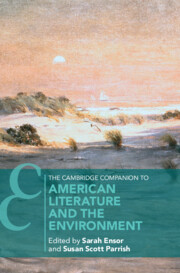Book contents
- The Cambridge Companion to American Literature and the Environment
- The Cambridge Companion to American Literature and the Environment
- Copyright page
- Dedication
- Contents
- Figures
- Contributors
- Acknowledgments
- A Note on the Cover Image
- Introduction
- Part I Environmental Histories
- Chapter 1 Scenes of Human Diminishment in Early American Natural History
- Chapter 2 Slavery and the Anthropocene
- Chapter 3 (In)conceivable Futures: Henry David Thoreau and Reproduction’s Queer Ecology
- Chapter 4 Narrating Animal Extinction from the Pleistocene to the Anthropocene
- Chapter 5 Pastoral Reborn in the Anthropocene: Henry David Thoreau to Kyle Powys Whyte
- Part II Environmental Genres and Media
- Part III Environmental Spaces, Environmental Methods
- Notes
- Index
- Cambridge Companions to …
Chapter 3 - (In)conceivable Futures: Henry David Thoreau and Reproduction’s Queer Ecology
from Part I - Environmental Histories
Published online by Cambridge University Press: 10 March 2022
- The Cambridge Companion to American Literature and the Environment
- The Cambridge Companion to American Literature and the Environment
- Copyright page
- Dedication
- Contents
- Figures
- Contributors
- Acknowledgments
- A Note on the Cover Image
- Introduction
- Part I Environmental Histories
- Chapter 1 Scenes of Human Diminishment in Early American Natural History
- Chapter 2 Slavery and the Anthropocene
- Chapter 3 (In)conceivable Futures: Henry David Thoreau and Reproduction’s Queer Ecology
- Chapter 4 Narrating Animal Extinction from the Pleistocene to the Anthropocene
- Chapter 5 Pastoral Reborn in the Anthropocene: Henry David Thoreau to Kyle Powys Whyte
- Part II Environmental Genres and Media
- Part III Environmental Spaces, Environmental Methods
- Notes
- Index
- Cambridge Companions to …
Summary
This chapter intervenes in ongoing queer ecocritical debates about reproductive futurity by turning to Henry David Thoreau’s engagement with nurse insects and trees. It demonstrates how Thoreau dislocates biological reproduction in both space and time, urging us to attend to a broader range of participants – and a broader range of contributing actions – in our account of the reproductive process. Arguing that such a complex, multispecies understanding of reproduction distinguishes Thoreau from both contemporary environmentalists, whose rhetoric often relies on normative logics of reproductivity, and queer theorists, who often critique such logics, the chapter theorizes an environmental ethic informed by the extant queerness of reproduction itself. In contrast to the contemporary activist organization “Conceivable Future,” which helps women decide whether to have children in a time of climate catastrophe, such a reading of Thoreau offers possibilities for solidarity and social change that customary definitions of reproduction have rendered inconceivable.
Keywords
- Type
- Chapter
- Information
- Publisher: Cambridge University PressPrint publication year: 2022

